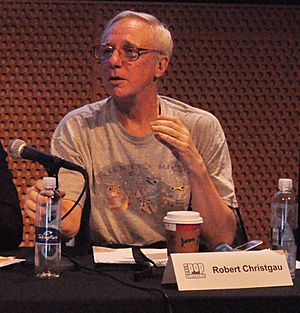Robert Christgau facts for kids
Quick facts for kids
Robert Christgau
|
|
|---|---|

Christgau in 2010
|
|
| Born | Robert Thomas Christgau April 18, 1942 New York City, U.S. |
| Occupation |
|
| Alma mater | Dartmouth College |
| Period | 1967–present |
| Spouse |
Carola Dibbell
(m. 1974) |
| Children | 1 |
Robert Thomas Christgau (born April 18, 1942) is an American journalist and writer who focuses on music. He is one of the most famous and influential music critics in the world. He started his career in the late 1960s and was one of the first professional rock critics.
Christgau was an early supporter of new music styles like hip hop and riot grrrl. He also helped introduce African popular music to listeners in the West. For 37 years, he was the main music critic for the newspaper The Village Voice. There, he created the famous Pazz & Jop music poll, where critics from all over voted for the best music of the year.
He is best known for his short, witty album reviews where he gave each album a letter grade, like in school. His writing style is unique, often mixing jokes, political thoughts, and clever references. Many people in the music world paid close attention to his opinions.
Contents
Early Life and Education
Robert Christgau was born in New York City on April 18, 1942. He grew up in the borough of Queens. His father was a fireman. Christgau became a fan of rock and roll in 1954 when the famous radio DJ Alan Freed came to New York.
He went to Dartmouth College and graduated in 1962 with a degree in English. In college, he became interested in jazz music. However, he soon returned to loving rock and roll. He was also inspired by a new style of writing called New Journalism, which made non-fiction stories read like novels.
Career as a Music Critic
Getting Started
Before becoming a music critic, Christgau wrote short stories. In 1964, he decided to become a journalist. He worked as a sportswriter and a police reporter for a newspaper in New Jersey.
He became a full-time writer after a story he wrote was published in New York magazine. He was one of the very first critics to write seriously about rock music. In 1967, he started writing a music column for Esquire magazine. He later moved to The Village Voice in 1969, where he would work for many years.
Writing for The Village Voice
In 1974, Christgau became the music editor at The Village Voice. He stayed there for over 30 years. During this time, he became a very important voice in music. He even joked about a "Rock Critic Establishment," a group of powerful critics that included himself.
In August 2006, Christgau was fired from The Village Voice after the newspaper was bought by a new company. After leaving the Voice, he wrote for other famous magazines like Rolling Stone and Blender. He has also taught about music at New York University.
Famous for His Reviews
The "Consumer Guide"
Christgau is most famous for his "Consumer Guide" column. It started in 1969 in The Village Voice. In this column, he would review about 20 albums in short, clever paragraphs. Each album got a letter grade, from A+ to E−.
An A+ meant the album was a masterpiece. A B+ or higher was a strong recommendation. He rarely gave grades lower than a C−. These reviews were later collected into three popular books:
- Christgau's Record Guide: Rock Albums of the Seventies (1981)
- Christgau's Record Guide: The '80s (1990)
- Christgau's Consumer Guide: Albums of the '90s (2000)
After leaving The Village Voice, he continued writing reviews in a similar format for MSN Music, Cuepoint, and Noisey. Since 2019, he has published his column in a subscription newsletter called And It Don't Stop.
The Pazz & Jop Poll
In 1971, Christgau started the Pazz & Jop poll. It was an annual survey where music critics from all over the country sent in their "top ten" lists of the year's best albums. The Village Voice would publish the results.
Each year, Christgau wrote a long essay to go with the poll results. In the essay, he would analyze the votes and talk about the music of that year. The poll became a very important event for music fans and writers. The Village Voice continued the poll even after Christgau left.
The "Dean's List"
Along with the Pazz & Jop poll, Christgau also published his own personal list of favorite albums of the year. He called it the "Dean's List." While he voted for his top ten in the main poll, his full list was often much longer.
These lists showed his personal taste and were followed closely by his readers. Below is a table of the albums he picked as number one on his Dean's List each year.
| Year | Artist | Album |
|---|---|---|
| 1971 | Joy of Cooking | Joy of Cooking |
| 1974 | Steely Dan | Pretzel Logic |
| 1975 | Bob Dylan and the Band | The Basement Tapes |
| 1976 | Michael Hurley, The Unholy Modal Rounders, Jeffrey Frederick & the Clamtones | Have Moicy! |
| 1977 | Television | Marquee Moon |
| 1978 | Wire | Pink Flag |
| 1979 | The Clash | The Clash |
| 1980 | The Clash | London Calling |
| 1981 | Various artists (Sugar Hill Records) | Greatest Rap Hits Vol. 2 |
| 1982 | Ornette Coleman | Of Human Feelings |
| 1983 | James Blood Ulmer | Odyssey |
| 1984 | Bruce Springsteen | Born in the U.S.A. |
| 1985 | The Mekons | Fear and Whiskey |
| 1986 | Various artists | The Indestructible Beat of Soweto |
| 1987 | Sonny Rollins | G-Man |
| 1988 | Franco and Rochereau | Omona Wapi |
| 1989 | Půlnoc | Live at P.S. 122 |
| 1990 | LL Cool J | Mama Said Knock You Out |
| 1991 | Various artists | Guitar Paradise of East Africa |
| 1992 | Mzwakhe Mbuli | Resistance Is Defence |
| 1993 | Liz Phair | Exile in Guyville |
| 1994 | Latin Playboys | Latin Playboys |
| 1995 | Tricky | Maxinquaye |
| 1996 | DJ Shadow | Endtroducing..... |
| 1997 | Arto Lindsay | Mundo Civilizado |
| 1998 | Lucinda Williams | Car Wheels on a Gravel Road |
| 1999 | The Magnetic Fields | 69 Love Songs |
| 2000 | Eminem | The Marshall Mathers LP |
| 2001 | Bob Dylan | "Love and Theft" |
| 2002 | The Mekons | OOOH! (Out of Our Heads) |
| 2003 | King Sunny Adé | The Best of the Classic Years |
| 2004 | Brian Wilson | Brian Wilson Presents Smile |
| 2005 | Kanye West | Late Registration |
| 2006 | New York Dolls | One Day It Will Please Us to Remember Even This |
| 2007 | M.I.A. | Kala |
| 2008 | Franco | Francophonic |
| 2009 | Brad Paisley | American Saturday Night |
| 2010 | The Roots | How I Got Over |
| 2011 | Das Racist | Relax |
| 2012 | Neil Young and Crazy Horse | Americana |
| 2013 | Vampire Weekend | Modern Vampires of the City |
| 2014 | Wussy | Attica! |
| 2015 | Laurie Anderson | Heart of a Dog |
| 2016 | A Tribe Called Quest | We Got It from Here... Thank You 4 Your Service |
| 2017 | Randy Newman | Dark Matter |
| 2018 | Noname | Room 25 |
| 2019 | Billie Eilish | When We All Fall Asleep, Where Do We Go? |
| 2020 | Various artists | Hanging Tree Guitars |
| 2021 | Neil Young and Crazy Horse | Barn |
| 2022 | Selo i Ludy Performance Band | Bunch One |
| 2023 | Olivia Rodrigo | Guts |
| 2024 | Louis Armstrong | Louis in London |
Writing Style and Influence
How He Wrote
Christgau's reviews are known for being very dense and full of ideas. He could pack a lot of meaning into just a few words. His writing is often described as witty, smart, and thought-provoking. For example, in a very short review of the Ramones album Leave Home, he praised its "power, wit and economy."
His style has influenced many rock critics who came after him. Spin magazine once said that without Christgau, rock criticism as we know it might not exist.
What He Liked (and Didn't Like)
Christgau has a wide range of musical tastes. His all-time favorite artists include Louis Armstrong, Thelonious Monk, Chuck Berry, the Beatles, and the New York Dolls. He has called Frank Sinatra "the greatest singer of the 20th century."
However, he also admits to having dislikes. He is generally not a fan of genres like heavy metal, art rock, progressive rock, and classical music. He once wrote that he found heavy metal's ideas of power to be old-fashioned. He also found it hard to write about certain kinds of jazz music.
"Dean of American Rock Critics"
Christgau is often called the "dean of American rock critics." "Dean" is a title for the most senior or respected person in a group. He actually gave himself this nickname as a joke in the early 1970s when he was still a young man.
As the years went by, the joke became a reality. Many people now agree that he has earned the title. When asked about it, Christgau said that while there is no official ranking for critics, he does believe that some critics are better than others.
Personal Life
Christgau married writer and critic Carola Dibbell in 1974. They have a daughter named Nina. He grew up in a religious family but is now an atheist.
He has been friends with other famous critics like Greil Marcus and the late Ellen Willis. He has also been a mentor to younger critics, helping them in their careers.
Books
- Any Old Way You Choose It: Rock and Other Pop Music, 1967–1973, Penguin Books, 1973
- Christgau's Record Guide: Rock Albums of the Seventies, Ticknor & Fields, 1981
- Christgau's Record Guide: The '80s, Pantheon Books, 1990
- Grown Up All Wrong: 75 Great Rock and Pop Artists from Vaudeville to Techno, Harvard University Press, 1998
- Christgau's Consumer Guide: Albums of the '90s, St. Martin's Griffin, 2000
- Going into the City: Portrait of a Critic as a Young Man, Dey Street Books, 2015
- Is It Still Good to Ya? Fifty Years of Rock Criticism 1967–2017, Duke University Press, 2018
- Book Reports: A Music Critic on His First Love, Which Was Reading, Duke University Press, 2019
See also
 In Spanish: Robert Christgau para niños
In Spanish: Robert Christgau para niños
- Album era


